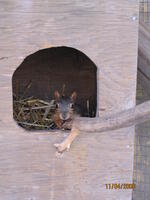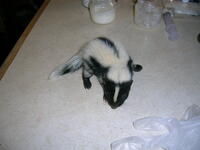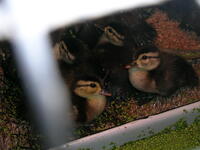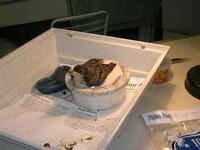Injured or Orphaned Wildlife
The Milford Nature Center is no longer offering Wildlife Rehabilitation Services for injured or orphaned animals. But, it is our intent to give an animal every opportunity to stay WILD. Please read the following information carefully and be absolutely sure the animal is in need of help. The best way to insure this is to call the nature center (785) 238-5323 or (785) 238-3108 during business hours with questions BEFORE you attempt to rescue the animal.
If you have found an orphaned wild animal:
Are you sure the creature is an orphan? Each year, hundreds of young wild animals are mistaken as orphans and turned over to rehabilitators for rearing. This happens most frequently to baby birds and to fawns. Over half of the fawns referred to wildlife rehabilitators are not orphans or injured, but "kidnapped" from their mothers. Here are some possibilities you may encounter:
Blown Down Nests
Bad weather can sometimes cause birds' nests to fall out of a tree. If you find a nest which has been blown down, but which has not been seriously damaged, place the nest (with the baby birds, eggs, or baby squirrels) back in the tree. If the nest has been damaged, place it in a small basket, such as a strawberry basket, and place it in the tree. If necessary, use twine to secure it.
If the baby bird is exceptionally young (has very little down), search for the nest and place the baby bird in it. If you are unable to locate the nest, contact a wildlife rehabilitator for instructions.
If the baby bird already has feathers and does not appear to be injured, leave it alone and keep an eye on it from a discreet distance. It is not unusual for baby birds to "fledge" from their nests before they have learned to fly. Watch for a parent attending the bird or foraging closeby. If the baby bird is in the street, place it under a nearby bush. If possible, lock up any lose dogs and cats for several hours. Do not handle the bird unnecessarily or remove it from the immediate area.
If, after several hours, no parent bird has tended the baby bird, contact a wildlife rehabilitator for advice.
If a wildlife rehabilitator advises you to bring the bird inside, keep it in a warm, dark, quiet spot. A shoe box lined with a folded towel works well. Be cautious giving the baby bird water; it can get fluid in its lungs. Do not attempt to feed it unless instructed by the wildlife rehabilitator. Never give any bird or wild animal cow's milk as it can make the animal sick. Some baby birds, such as song birds, cannot digest bread.
Follow the advise of the rehabilitator and take it to the rehabilitator as soon as possible.
Baby squirrels sometimes fall out of a nest that has been damaged in a storm or by an aggressive male squirrel. The squirrel may not be an orphan at all, but may have just fallen from its nest. If one squirrel has fallen from a damaged nest, others may have fallen out as well. Search the immediate area. Look under bushes and fallen leaves where other babies may have taken cover. You may warm the baby squirrel in your hands or by holding it close to your body and then place it at the base of the tree. Lock up any lose dogs and cats and keep watch, from a distance, for one to two hours. Given time, the mother will return and retrieve her baby. The scent of humans will not stop the mother from taking back her baby. If the weather is cold, line a box with some towels and a hot water bottle wrapped in a towel. Place the baby in the box and the box at the base of the tree.
If the mother squirrel has not returned for her young within two hours, you probably do have an orphan on your hands. Contact a wildlife rehabilitator. If the rehabilitator advises you to bring in the squirrel, place it in a cat carrier or a shoe box (with air holes poked through the top), lined with a folded towel.
It is not unusual for people to encounter young fawns whose mothers have left them "bedded down" while out foraging. If the fawn is not crying, is not being bitten by fire ants, its eyes are not swollen, and it has no visible wounds, leave it in peace. Any handling will only cause stress to the fawn. If the fawn is clearly sick or has been injured, contact a wildlife rehabilitator.
It is not true that birds or mammals will reject their young once they have been handled by humans. Nonetheless, the handling of wild babies should be avoided or kept to a minimum. Handling by humans can be stressful to the animal. Also, the human scent can sometimes attract predators seeking food.
It is not unusual for birds to fly head first into a window. Sometimes the blow will kill the bird, but other times it will only stun it. If, after hitting the window, a bird is alive but does not try to run away when you approach it and allows you to lift it gently in your cupped hands, it is probably in shock. If it is a warm day and the bird is in a yard where there are not any dogs, cats, or other predators, leave it alone. If the bird is in an area where it is vulnerable to predators, bring it indoors and place it in a brown grocery sack with the top folded closed or a box. Watch or check the bird frequently. Within a brief time, it should begin to move about and appear more alert. Once the bird shows signs of recovery, take it outdoors and release it.
If you have large plate glass windows and birds are frequently knocking themselves out, consider purchase a hawk silhouette to place on your window. This will discourage birds from flying directly towards your windows.
Click here for more information about wildlife rehabilitation and to locate a wildlife rehabber in Kansas.











